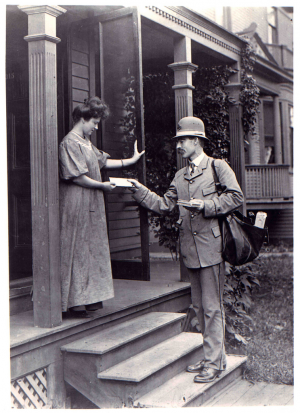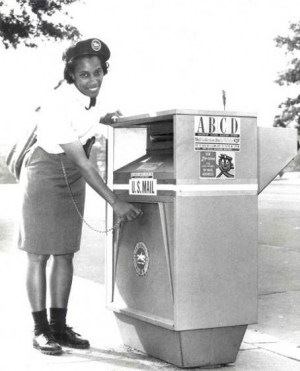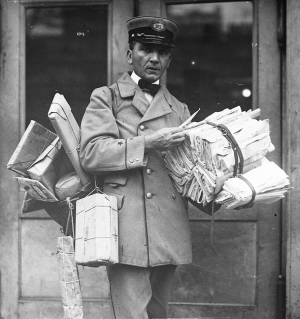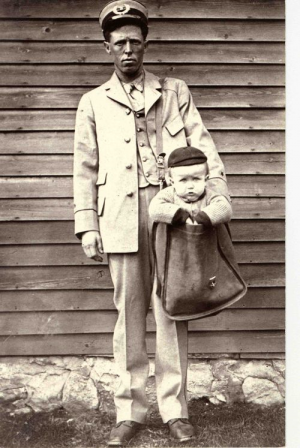A day in the life of a man who delivers the U.S. Mail
By Aarionna Goodman
6635-37 Charles Street: Mayfair Garden Apartments
There was power at the end of his gold chain. As he swung it back and forth in his gloved palm, the keys jingled and clanged against each other, announcing their unordinary presence.
“Do not duplicate” they all read in tiny raised letters.
He had on Under Armour sneakers and the standard issued blue with navy striped pant; which was pressed and creased to perfection.
“The loss of feeling always starts with your fingers,” he said in light of the cold day. “They no longer feel like your own, or like they’re a part of your body.”

His hood was drawn around his neck and tied under his chin to block out the biting wind. On his back, under the official seal of the eagle read, “United States Postal Service” in capital white letters. On his shoulder, reaching the middle of his left side, sat his bag. Big, wonderful and endless. It held the lives of the people around him. Cable bills, PECO bills, acceptance letters, or credit card applications. All and more have seen the insides of this blue canvas bag.
His possession of both the keys and the bag, however, was not unique.
Many other Mail Carriers swung their chains and wore their bags over their shoulders. There is, however, only one Aaron Goodman; and this route is his route.
Goodman, 43, husband, and father of three, has been with the Postal Service for almost 16 years. During those years, Goodman has carried for three different stations; this station marks his third route which he has been with for three years.
Northeast Philadelphia was colorful under the afternoon Fall sky. Trees were almost bare with the steady tones of red and brown hanging onto their branches. With the snow the day before turning to slush underfoot, the world looked muted and wet. The colors seemed pale without the shining of the sun. The cold breeze that brushed against the skin bit in small bites.
The apartments were not like normal houses. They were very different in size and close together. The spaces between them were akin to alleyways. Goodman moved quickly, using the keys at the end of his gold chain to open every door and to open the communal mailboxes within.
Other than taking outgoing mail from a woman living in one of the lower levels and letting in a locked out apartment manager, Joe, there was not much interaction. Goodman took on the demeanor of the patrons of Mayfair Garden Apartments: quiet, polite and out of sight.
Frankford Avenue and Knorr Street
He ordered both a double chocolate chip and pistachio muffin from the bakery in Shoprite before turning to the cashier at the customer service desk behind him.
“Hello!” he said. With her blonde hair braided in two pigtails and a red collared shirt on her back, she also said her greeting.
“I don’t want this,” she said playfully to Goodman has he handed her the mail. Sharing laughter he turned and waved. “Have a good one, you guys,” he said.
“Happy Thanksgiving!”
Most of Goodman’s conversations were a lot like this. Brief, pleasant banter.
Frankford Avenue and Longshore
The Streets were wide (double-laned on either side). Running across it was a sport that Goodman’s route had trained him for.
There were billboards everywhere flashing their neon lights. “Come in, stay awhile,” they seemed to say.
Walking to a PNC Bank, Goodman goes through a metal detector on both his entrance and exit, placing the mail on a desk he knew very well.
Standing in an elevator he faced a personal hygiene poster and a “fresh thinking” flyer as he waited for the doors to open in a waiting room with “LIVE With Kelly and Ryan” playing in the background. Handing a single envelope to a woman through a window, he returned to the elevator.
He laid mail down in an AAMCO and yelled, “What’s going on, D!?” to a man working in the back.
Walking into Kendall Motor Oil he stopped in front of a man at the cash register.
“How are you?” said the man.
“Not bad so far, how about yourself,” said Goodman.
After responding with a monotonous “good”, Goodman made his farewell and walked into another building where a woman and a man were immersed in conversation before the manager who sat behind his desk. The couple did not look up as Goodman entered, but the manager readily held out his hand without question.
Goodman walked in and out of lives mid-scene. His constant and punctual interruption was expected and even anticipated. His presence meant they were getting something.
Hair Wizards on Frankford and Magee asks for packages every time Goodman delivers to their shop. He laughed as he recounted this memory. It was funny to him how many of his patrons related him to United Parcel Services (UPS). Mail Carriers had only small parcels, things that can be easily slipped behind a screen door or in a mailbox. No matter how many times Goodman told them he had no packages for them, they continued to ask every time he made his rounds, whether they were expecting packages or not.
Frankford Avenue and Wells Streets
One does not think of a Mail Carrier walking into a Pizza Hut or a Dunkin Donuts and not order mini-cinnamon buns or an iced mocha.

He went to chiropractic offices, hookah bars, foot specialists, hoagie shops and health aid pharmacies.
The owner of an Italian bakery, dressed in a purple shirt, a grey sweater, and a green apron exclaimed, “no bills, right?”
Goodman sighs and smiles, “no bills today”.
“Yay,” said the lady.
They both laugh
“Have a good one,” said the lady.
“You as well, thank you,” said Goodman.
Like Goodman’s other interactions, he was quick, moving from front door to side door in under a minute. From placing mail on desks to sliding them in a mail slot at the very bottom of doors, he never lost his pace. However, when his route slowly shifted to the residential side of Frankford Avenue, his conversations became less brief, and there was a clearer feeling as to who Goodman was delivering mail to.
Corner of Frankford Avenue and Fanshawe Street
Recycling and garbage cans lined the sidewalk.
Goodman began to jog from house to house. Some had rocking chairs on their porches, patterned chairs, play sets on their lawns with plastic slides, swings, toy cars, and seesaws. Some let their lawns grew their hair out; weeds intermingled with dry leaves and debris. Others were simply unique.
The front lawn of one house, in particular, looked lived in, and the newfound slush from the impromptu snowstorm seemed to have washed the inhabitants away. It had the usual small steps in front of the door with an awning overhead, but there was a lot more that shadowed the wet stoop.
As Goodman walked further down to the mailbox, there sat a soaked cushioned burgundy chair along the pathway. There were two shopping carts, one with a blue trash bag attached to the front holding a large number of empty soda cans. Between the carts and the chair sat a waist-high brick structure with a plant growing out of its middle. On the right, under a wooden weather-beaten table sat a single Timberland boot, and on top of the table sat an unopened envelope and murky water in a flowerless vase.
Charles and Unruh Street
After sorting out the mail for the next couple blocks to come, a crossing guard stops Goodman before he can sling his bag over his shoulder. She told him about her horrible weekend and the status of her car after it broke down the night before.
“Thank you for all that you do!” She yelled from the window as he crossed the street.
As Goodman worked the block, he made something of a ruckus to let people know that their mail had arrived. With each slam of a screen door then came an inquiring head out of the front door.
A little girl poked her out and thanked him.
In a neighboring home, another child was already at the door, waiting with their hand out.
“Hi Sweetie!” said Goodman. “No mail today.”

On that same block, there came the newspaper delivery truck. The men in the driver and passenger seats were flinging bundles just a fast as Goodman was hopping over railings to get to the next house. Even without words, the community seemed to be speaking (competing even) with one another. There was a rush between mailman and the newspaper delivery men, not to get home but to get to the end of the block.
The game was wordless but, one could hear it in the bumping music playing on the van’s stereo and the see it in the smile dancing on Goodman’s lips.
Erdrick Street
Goodman let another door lightly slam and an older woman’s head popped out with an outstretched hand holding a water bottle and Pepsi.
She promised him something warm next time and Goodman politely declined and said it was too much and altogether too cold.
She hushed him and said he was already in her budget.
“Trust and endearment, that’s what people have for a mailman,” said Goodman.
Glenview Street
Here, he heard the barking before he saw the dogs and he reached into his canvas blue bag and pulled out dog treats.
The dogs went wild, dressed in their wintry overcoats.
Another man met Goodman at the gate, decked in Eagles paraphernalia. “Let me save you a few steps,” he said to Goodman.
Before letting Goodman continue, he also invited him in for a cup of hot chocolate.
By this time, Goodman was losing the light of the day, but he didn’t care. These small interactions filled him up.
“You build a special relationship with everybody that you talk to,” he said. “It becomes this special relationship that is much more than the weather, it’s much more than the local sports teams. It’s ‘how’s your kids, how’s your wife doing’?”
Because these interactions, though small, happen every day, they become meaningful and enlist natural and authentic familial feelings. “The dogs become like your own pets and the old ladies giving out Pepsi’s become these maternal like figures”. These are the moments that make the community.
Historic photos courtesy of the U.S. Postal Service
